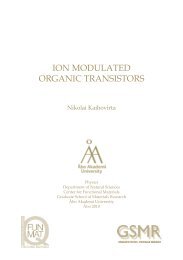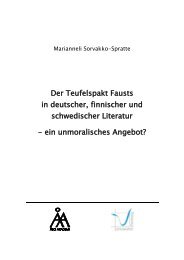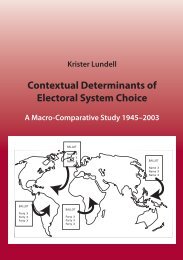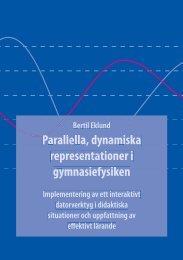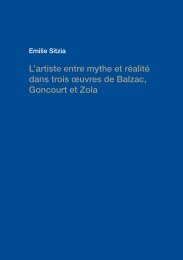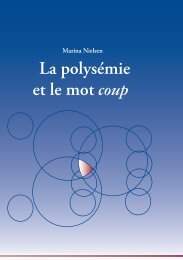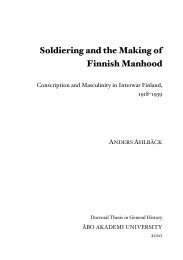96Die wichtige Stellung der platonischen Bilder und Gedankengänge in derAnthropologie <strong>Calvin</strong>s haben Babelotzky und Schwendemann in ihrenUntersuchungen hervorgebracht. 188 Trotz der Einflüsse und derÄhnlichkeiten ist <strong>Calvin</strong>s Anthropologie keine Wiederholung einerplatonischen Anthropologie. Backus hat festgestellt, dass er neben Platonauch Aristoteles und die Stoa als Quellen zur Anthropologie benutzthatte. 1894.2. Die Fähigkeiten der Seele zur Erkenntnis des universalen <strong>Recht</strong>s<strong>Calvin</strong> ist gegen den Gedanken Platons über zwei Seelen, eine wahrnehmende(sensitiva) und eine denkende (rationalis) Seele 190 , aber er kanndie <strong>bei</strong> einigen Philosophen vorkommende Einteilung der Seele in dreikognitive und drei lustausdrückende Fähigkeiten akzeptieren, obwohl ersie als unklar betrachtet. 191 Er hat auch nichts gegen die Auffassung, dassdie Seele zwei Teile hat: eine begehrende Kraft, die der Vernunft gehörigist, und den Intellekt, der der Vernunft teilhaftig ist. 192 Er betrachtet esauch als möglich, die Seele in drei Teile einzuteilen: Wahrnehmung oderSinn (sensus), Verstand (intellectus) 193 und Trieb (appetitus). 194 Ihm reichtKörper–Seele -Dualismus spiegelt sich auf das Verhältnis zwischen den Geschlechtern ineiner Abwertung der Frau, und er macht die Gottes-Lehre und Eschatologie <strong>Calvin</strong>sambivalent. Wenn <strong>Calvin</strong> aber die Auferstehung des Körpers behandelt, reißt er sich vomDualismus Platons los, und die in Unabhängigkeit, die der Körper da bekommt, bewirktverantwortungsvolle Verwirklichung des menschlichen Lebens. Schwendemann 1996,201–214.188 Babelotzky 1977 “Platonische Bilder und Gedankengänge in <strong>Calvin</strong>s Lehre vomMenschen”, Schwendemann 1996 “Leib und Seele <strong>bei</strong> <strong>Calvin</strong>. Die erkenntnistheoretische undanthropologische Funktion des platonischen Leib-Seele-Dualismus in <strong>Calvin</strong>s Theologie”.189 Backus 2003, 89, 90.190 Platon, Staat, IV 439 CD191 Ixv6192 Ixv6193 Die intellektuelle Fähigkeit der Seele kann man entweder “Vernunft” oder“Verstand” nennen. Zwischen den <strong>bei</strong>den gibt es kleine Unterschiede in Akzentuierung desInhalts, aber sie sind doch fast deckungsgleich und können in diesem Zusammenhangidentisch verwandt werden, wie auch Baur 1965, 207–208 feststellt: “Die von <strong>Calvin</strong>gemachte Unterscheidung von Vernunft oder Verstand einerseits und Gewissen andererseitsbedarf aber noch einer Erklärung. Einleitend sei zu den Begriffen von Vernunft und Verstandgesagt, daß <strong>Calvin</strong> sie zutreffend nicht eindeutig voneinander abgrenzt, wenn auch derVerstand <strong>bei</strong> ihm vor allem die Bedeutung des "Erkenntnisvermögens", die Vernunft
97aber die Einteilung in zwei Teile, Intellekt und Willen, aus. 195 Die <strong>bei</strong>denTeile sind verdorben, denn als natürliche Fähigkeiten liegen auch sieunter den Folgen des Sündenfalls. 1964.2.1. Der VerstandFür die intellektuelle Fähigkeit der Seele benutzt <strong>Calvin</strong> verschiedeneWörter. In der Institutio kommen die Worte intellectus und intelligentia anmanchen Stellen vor, aber auch die Worte ratio und mens. 197 <strong>Calvin</strong> kannsogar zwei verschiedene Worte in ein und demselben Satz benutzen. 198Inhaltlich sind die Begriffe nicht ganz identisch. Den größten Unterschiedhat mens, das <strong>bei</strong> <strong>Calvin</strong> eine lokale Bedeutung hat. Es bezeichnet den Ortder intellektuellen Handlung im Menschen oder aber auch den Sitz desdagegen die Bedeutung des "Leitungsvermögens" besitzt. Zwar werden im philosophischenSprachgebrauch oft <strong>bei</strong>de Begriffe unterschieden, doch ist ihnen inhaltlich damit noch keinfest umrissener Bereich zugewiesen. Zudem können <strong>bei</strong>de Begriffe allgemein jene Fähigkeitkennzeichnen, durch die sich die menschliche Natur von der Tierwelt unterscheidet. ImFolgenden werden deshalb Vernunft und Verstand als Begriffe mit gleichem Inhaltverwandt.”194 “Sicui libet alio modo animae potentia distribuere, ut altera vocetur appetitiva: quaetametsi rationis expers, rationi tamen obtemperat, si aliunde dirigatur: altera dicaturintellectiva, quae sit per seipsum rationis particeps [Arist. lib. 1. Ethi. cap. ult.]: non valdereclamo. Nec istud refellere velim, tria esse agendi principia, sensum, intellectum, appetitum[Item lib. 6. cap. 2.].” Ixv6. — In jenen drei Eigenschaften sind alle Funktionen der Seelezusammengefasst. (Olsson 1943, 214–215). S. auch Augustijn 1988, 132–133.195 "Sic ergo habeamus, subesse duas animae partes, quae praesenti instituto conveniant,intellectum et voluntatem." Ixv7 — Stauffer 1977, 208: "Pour <strong>Calvin</strong>, indéniablement l'âmecomprend l'intelligence et la volonté." Schreiner 1991, 64: “<strong>Calvin</strong> ... preferred a simplerdefinition ... which divided the soul into only two faculties: the understanding and the will.”So auch Helm 2004, 135 “He prefers to think of the soul in terms that anyone I canunderstand, simply as composed of understanding and will. The understandingdistinguishes good from evil, what should be pursued and what should be avoided. The willendeavours to follow such proposed pursuits avoidances. But — and this qualification is hecritical point as far as <strong>Calvin</strong>'s relation to the philosophers is concerned — bothunderstanding and will are corrupted by the Fall.”196 Helm 2004, 136 “By calling understanding ‘a natural gift', <strong>Calvin</strong> means that it is partof the nature or essence of humanity, 'inseparable from man's nature', and is such that itcannot disappear without our losing our nature and becoming bestial. Reason remains asweakened but not obliterated, in two ways. First, not every human intention is depraved.”197 Zum Beispiel intellectus Ixv7, intelligentia IIii13, ratio IIii17, mens IIii13198 Z.B. "Ergo animam hominis Deus mente instruxit, qua ... preerunte rationis lucevideret:" Ixv8
- Seite 1:
Kalle ElonheimoDas Universale Recht
- Seite 4:
4.2.3. Von der Erkenntnis zur Aktio
- Seite 7 und 8:
31. EINLEITUNG“Porro haec ipsa qu
- Seite 9 und 10:
5Von Orléans wechselte der junge H
- Seite 11 und 12:
7Studien die Denkweise der Rechtswi
- Seite 13 und 14:
9selben Zeit erschien auch die erst
- Seite 15 und 16:
11bachtung wird dadurch bestätigt,
- Seite 17 und 18:
13zum Naturrecht zu rekonstruieren.
- Seite 19 und 20:
15Prinzipien, die dem Menschen inne
- Seite 21 und 22:
17Ebenso gibt er zu, dass Calvin si
- Seite 23 und 24:
19positiven, insbesondere staatlich
- Seite 25 und 26:
21und miteinander verglichen. Dabei
- Seite 27 und 28:
23Wie schon der Name des Werkes ver
- Seite 29:
25Kommentare und Predigten zu Mose-
- Seite 35 und 36:
31Seine weiteren Quellen hat Gratia
- Seite 37 und 38:
33Einrichtung kann zum Naturrecht i
- Seite 39 und 40:
35ist. 20 So sind in seinem Denken
- Seite 41 und 42:
37Der freie auf das Gute um des Gut
- Seite 43 und 44:
39unveränderlich, aber was die Hin
- Seite 45 und 46:
41Sinne ist: in Bezug zu Gott und i
- Seite 47 und 48:
43Naturrechtslehren, die einzelne R
- Seite 49 und 50: 45Dinge außerhalb Gottes betrachte
- Seite 51 und 52: 47Fragen, die man mit Hilfe der ant
- Seite 53 und 54: 49beschädigen, wenn man dem Naturr
- Seite 55 und 56: 51Menschen dazu bringt, dass er dem
- Seite 57 und 58: 53Erkenntnisse teilt er noch in zwe
- Seite 59 und 60: 55Der schöpfende Gott ist der drei
- Seite 61 und 62: 57glauben. Wer nicht glaubt, denkt,
- Seite 63 und 64: 59vollen Wirken ist Gott eine absol
- Seite 65 und 66: 61ordo naturae, kann aber auch bede
- Seite 67 und 68: 63erstreckt. 50 Er begründet sein
- Seite 69 und 70: 65schriften über sexuelle Sittlich
- Seite 71 und 72: 67In einer tieferen Bedeutung zeigt
- Seite 73 und 74: 69Doppelgebot der Liebe bringt die
- Seite 75 und 76: 71Katechismus vom Jahre 1537 hat Ca
- Seite 77 und 78: 733.2.5. Fokussiertes GesetzGott ha
- Seite 79 und 80: 75Die Rechtsvorschriften des Alten
- Seite 81 und 82: 77- potentia ordinata Dei: ob Gott
- Seite 83 und 84: 79v. Chr.) nennt. 127 Die Aufkläru
- Seite 85 und 86: 81Zeremoniegesetz, dessen Gültigke
- Seite 87 und 88: 83Wenn es um die Folgen des Sünden
- Seite 89 und 90: 85vieler Völker besser ist, ein st
- Seite 91 und 92: 87erhaltenen Fähigkeiten sind dem
- Seite 93 und 94: 894.1.2. Dualistisches Menschenbild
- Seite 95 und 96: 91Seele ist unsterblich 160 und der
- Seite 97 und 98: 93wenn er über “unsterblichen Ge
- Seite 99: 95Menschen zur Erfüllung der irdis
- Seite 103 und 104: 99dem Bild Gottes und der Vernunft
- Seite 105 und 106: 101Bild, in dem zwei Welten mit je
- Seite 107 und 108: 103kunst, die zum Vorschein bringen
- Seite 109 und 110: 105Oben haben wir schon festgestell
- Seite 111 und 112: 1074.2.2. Der WilleDie andere Fähi
- Seite 113 und 114: 109leitende Königin für den Wille
- Seite 115 und 116: 111Wirken hat, aber auch diese Frei
- Seite 117 und 118: 113Begriffsgeschichte anhand der Li
- Seite 119 und 120: 115In das mittelalterliche Denken k
- Seite 121 und 122: 117nicht unter das Gewissen (syneid
- Seite 123 und 124: 119ein Empfinden über das Urteil G
- Seite 125 und 126: 121seinen Sitz im Menschen und wirk
- Seite 127 und 128: 123Obwohl das Gewissen für Calvin
- Seite 129 und 130: 125nehmen, aber anderseits kann er
- Seite 131 und 132: 127verdorben, nicht kann. 289 Der V
- Seite 133 und 134: 129Gerechtigkeit des Gesetzes in ih
- Seite 135 und 136: 131stellungen billigen und mit Belo
- Seite 137 und 138: 133Im Lichte jener Predigt scheint
- Seite 139 und 140: 1355. WIRKSAMKEIT DES UNIVERSALEN R
- Seite 141 und 142: 137bedeutet, dass der Mensch sie au
- Seite 143 und 144: 139Nicht-Gläubige können moralisc
- Seite 145 und 146: 141gemeinschaftliche Gebrauch des G
- Seite 147 und 148: 143zusammen betrachte, komme ich zu
- Seite 149 und 150: 145der vollständigen Einhaltung de
- Seite 151 und 152:
147geholfen wird. 41 Die Menschlich
- Seite 153 und 154:
149Fluch und den Tod. Nach Calvin i
- Seite 155 und 156:
151der negativen Form und in der In
- Seite 157 und 158:
153untergeordnete Stellung als Ausd
- Seite 159 und 160:
155alterliche weltliche als auch ka
- Seite 161 und 162:
157versuche ich, die Stellung des N
- Seite 163 und 164:
159stück oder Gebäude und hält e
- Seite 165 und 166:
161denken viele, dass sie frei und
- Seite 167 und 168:
163Wenn Calvin, anders als es im Ch
- Seite 169 und 170:
165keitsbild von ihm: in der Lehre
- Seite 171 und 172:
167Die Richtschnur für Gesetze bes
- Seite 173 und 174:
169Calvin schließt sich der Tradit
- Seite 175 und 176:
171Das Gesetz hat im Denken Calvins
- Seite 177 und 178:
173gerechnet. Obwohl die ganze Natu
- Seite 179 und 180:
175Entscheidung entzogen werden, we
- Seite 181 und 182:
177Gewissen vor allem ein geistlich
- Seite 183 und 184:
179Lage eines Menschen aus zu sagen
- Seite 185 und 186:
181Zinsnahmeverboten verpflichten n
- Seite 187 und 188:
1837. QUELLEN, LITERATUR UND ANHANG
- Seite 189 und 190:
185CCCM Corpus Christianorum, Conti
- Seite 191 und 192:
1871963 L'homme et la femme dans la
- Seite 193 und 194:
189VJean Calvin. Les hommes et les
- Seite 195 und 196:
191Lane, A.N.S.1981 Calvin's Use of
- Seite 197 und 198:
193Exiztenz heute, N.F. 152. Münch
- Seite 199 und 200:
195Positionen. Opladen.Veijola, Tim
- Seite 201 und 202:
197Aristoteles . . . . . . . . . .
- Seite 203 und 204:
1997.5. Anhang: Calvins Gliederung
- Seite 205 und 206:
201Lev 19:17 / Lev 19:18 / Lev 19:1
- Seite 207:
"Porro haec ipsa quae ex duabus tab



